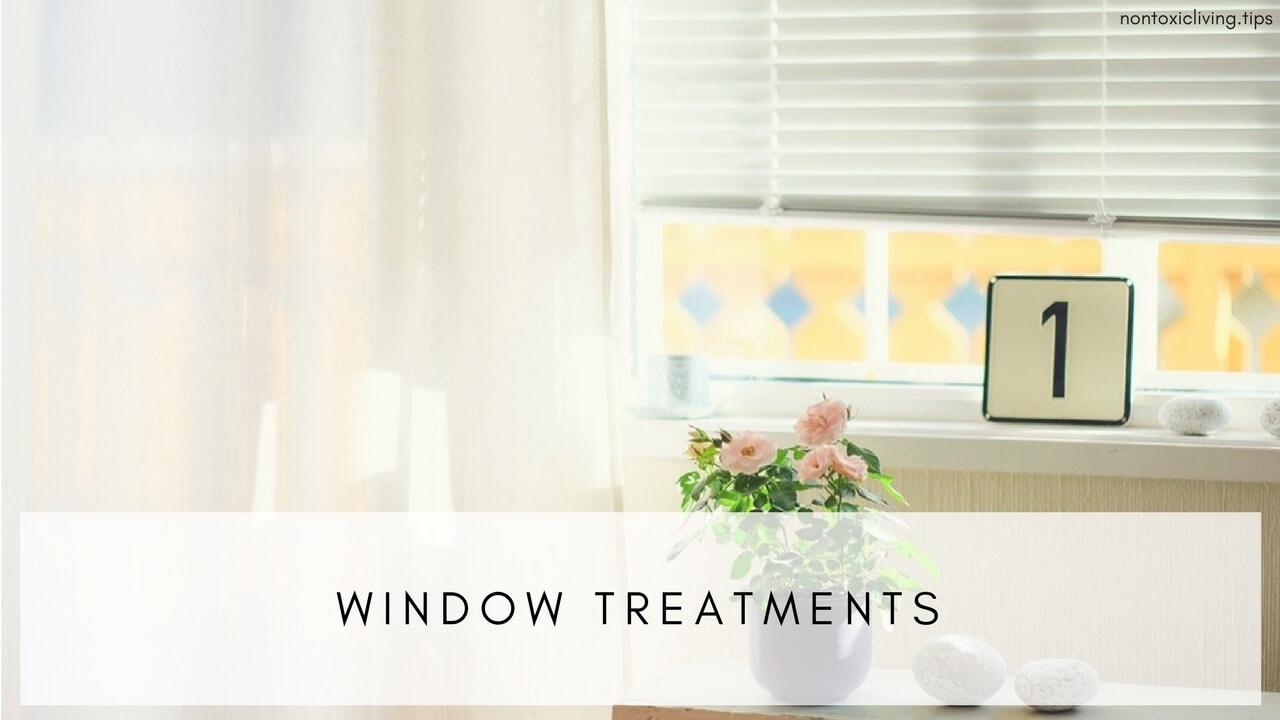
Healthier Window Treatments
Mar 22, 2018by Angela Cummings and Sophia Ruan Gushée
“Eco-friendly” is a term used to describe things that are good for nature, to preserve this beautiful earth. Recycling and conservation (of trees and energy) are cornerstone ideas and actions when it comes to eco-friendly efforts.
But what about the impact of toxic chemicals that are found in everyday products? They too are affecting our world—harming aquatic life, the animal kingdom, and humans as well.
You might be gazing out the window pondering this thought. And looking right past one of the many products that typically are made from harmful chemicals: window treatments.
Chemicals in Window Treatments
Standard window treatments—like shades, blinds, and drapes—are often made from synthetic materials, including vinyl (also called polyvinyl chloride or PVC), polyester, rayon and nylon. These materials are made from chemicals such as phthalates, chlorine, formaldehyde, pesticides and PFCs. (1) And they are in the VOC and solvent chemical families, which are included in the U.S. Environmental Protection Agency’s list of Hazardous Air Pollutants (HAPs).
Hazardous Air Pollutants. HAPs can get into soil or water (surface water), and can be absorbed by plants and animals. They can affect the health of animals, similar to humans, including the possibility of cancer, neurological, reproductive, developmental, respiratory and other health conditions. (2)
VOCs. VOCs may cause short-term effects—like headaches, dizziness, visual disorders, fatigue, loss of coordination, allergic skin reactions, nausea, memory impairment; and long-term effects—like cancer, damage to the liver, kidneys and central nervous system. (3)
Solvents. Solvents may be linked to asthma, cancer, damage to kidneys, liver, lungs, nervous system, development system, reproductive system, mental illness, depression, fatigue, confusion, dizziness, feeling drunk or “high”, lack of coordination, headache, nausea, stomach pains, skin rashes, cracking or bleeding skin, chest tightness, shortness of breath and irritation of eyes, nose and throat. (4)
Healthier Window Treatments
When choosing window treatments, consider buying products that are better for the environment and human health. Below are a few eco-friendly window treatments that are healthier for people too!
Wood blinds and shutters. When considering window treatments made from wood, check the type of wood and type of finish (paint, stain, finish) that is used. Hardwood, or wood that is certified by the Forest Stewardship Council (FSC), are typically eco-friendly and healthier options. The FSC certification involves review (and certification) of the wood product's impact on the environment (in terms of protection of water, old-growth forest, natural forest cover, and highly hazardous chemicals). (5) Look for finishes—like paint, stain, or sealants—that are zero- or low-VOC.
Drapes and Sheers. Adorn windows with drapes or sheers that are made of natural materials—like linen, cotton, organic cotton, and silk. Consider drapes that are colored with non or less toxic dyes, and are free of finishes. Also, avoid drapes and sheers that are labeled “stain resistant.” “water resistant,” or “wrinkle free.”
Vine and Twig. Straight from nature, vine and twig window treatments decorate windows but are not typically used for creating privacy like other window treatment options. Sometimes do-it-yourselfers will make vine and twig window treatments themselves. Make sure that the materials used do not contain fungus, mold, or chemicals like pesticides.
Conclusion
When choosing window treatments, consider their impact on the environment and human health.
- Opt for products that are made from natural fibers and materials and contain the least amount of chemicals as possible.
- Look for FSC certified products (for wood products), natural materials such as cotton, linen, and silk, and finishes (paints, stains, finishes) that are zero- or low-VOC and are made from the least amount of chemicals.
- Avoid added chemical finishes such as those labeled “wrinkle free”, “stain resistant” or “water resistant”.
Choosing eco-friendly products that are made with fewer chemicals is a win-win for all. You’ll be helping the environment and people at the same time!
References
(1) A to Z of D-Toxing, Works Cited Part 3 and 4
(2) U.S. EPA Hazardous Air Pollutants
(3) Tox Town - VOCs
Stay connected with nontoxic lifestyle news and updates!
Receive our free Ruan Living Nontoxic Cleaning Guide when you join our email list.
Don't worry, your information will not be shared.
We hate SPAM. We will never sell your information, for any reason.







